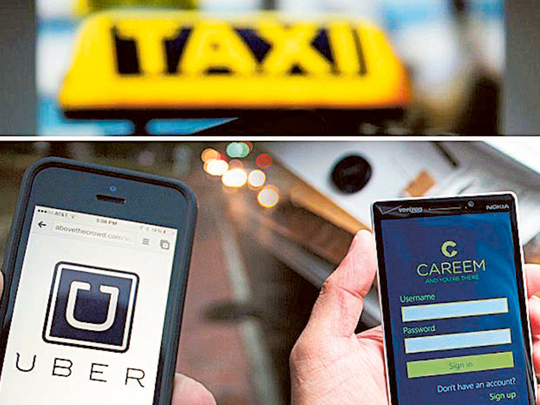
ISLAMABAD: Pakistan’s provincial Sindh High Court (SHC) will on February 9 hear a case involving digital ride-hailing services Careem and Uber, whose operations were suspended for “illegally” operating private vehicles for commercial purposes.
Careem and Uber were earlier served notices by provincial governments of Punjab and Sindh and asked to suspend their operations for failing to register private cars used for commercial purposes and for not obtaining fitness certificates and route permits.
Punjab Government’s Provincial Transport Authority said Uber, Careem and another ride-hailing service, A-One, were not complying with regulatory body in Lahore.
The companies are required to register private cars as well as obtain certificates of fitness and route permits, according to the Punjab Transport Authority.
Sindh Transport Minister Nasir said that Uber and Careem had not been banned in Sindh but only served with notices to acquire route permit and excise and taxation department, Geo News reported.
“These unregistered companies and vehicles can create issues regarding safety of lives and property of the masses,” the notification said. Only 8-10 out of a total of 1,000-1,500 Uber cars have agreed to comply with authority’s rules and obtain NOCs (no-objection certificates), Sindh Transport Secretary Taha Farooqi was quoted as saying by Dawn.
Popular with urbanites
The ride-hailing services — currently available only in major cities like Karachi, Islamabad and Lahore — are popular among Pakistan’s urban class for their smart technology, door-to-door services and affordability.
Uber wants to work with Pakistan’s policymakers and regulators.
In a statement emailed to Gulf News, Uber Pakistan said it would “continue to work with regulators and policymakers to ensure that Pakistanis have access to [a] safe, affordable and efficient transportation option.”
Meanwhile, Uber will stand by its driver-partners to help them “earn a sustainable income for themselves and their families.”
Careem hopes to support Pakistan government to provide facilities and create jobs:
In a live broadcast message, Managing Director of Careem Pakistan, Junaid Iqbal, said Careem is open to working with Pakistan government on laws and regulations. He asked provincial government to embrace the new technology, the concept of ride-hailing as it will create hundreds of thousands of jobs.
“Careem aims to work with the Government of Pakistan and hope to create 100,000 jobs by the end of 2018” Iqbal said. “[Together] we can create jobs and encourage entrepreneurship,” he said, terming unemployment as the root cause of all problems in Pakistan, including terrorism.
Citing examples of Malaysia and India, where new transport rules are under review, and of Saudi Arabia, where all private cars have been declared public, Iqbal assured Careem’s compliance with laws and urged Pakistan government to support ride-hailing friendly laws.
Dubai-based Careem hit the roads in Karachi and Lahore, and later Islamabad, in October 2015 whereas San Francisco-based ride-hailing company Uber started operations in Lahore in 2016.
Careem, founded in 2013, now has a market value of more than $1 billion and offering its services in more than 50 cities in Middle East, North Africa and South Asia region. Careem recently announced expansion of its services to three new cities of Pakistan: Peshawar, Hyderabad, and Faisalabad.
Ban on digital ride-hailing services across the world:
Mobile-app ride-sharing companies like Uber and Careem have defied regulatory opposition in various countries, stimulating new legislations.
Uber has faced protests, bans and legal action from governments, drivers, passengers and competitors around the world including Australia, Canada, China, Denmark, France, Germany as well as the UK and some states of the United States.
Uber was banned in 2014 by transport authorities in Hyderabad, India, for not having licenses to operate in the city. In Malaysia, city authorities cracked down against ride-sharing apps for offering “illegal” taxi services. In 2016, both Careem and Uber briefly halted their services in Abu Dhabi over licensing issues.
In most such cases, the ride-sharing apps complied with the legislations while in some instances new legislation was introduced to facilitate people.












